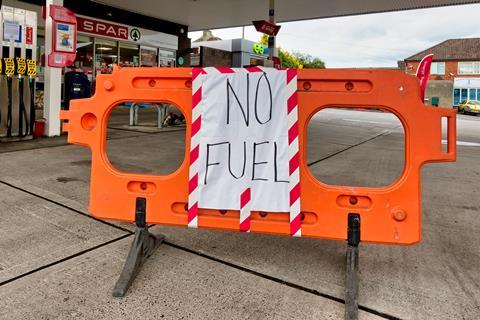
Prime Minister Boris Johnson laid the blame for the UK HGV driver shortage and the petrol pump crisis squarely at the feet of the road haulage industry this week.
Speaking on the Andrew Marr Show on BBC 1 yesterday (3 October), as the army prepared to help deliver fuel supplies to petrol stations hit by the HGV driver shortage, Johnson said: “The issue of the forecourt is fundamentally one of supply…what we had for decades was a system whereby basically the road haulage industry, which is a great industry full of fantastic people, was not investing in the truck stops, not improving conditions, not improving pay.
“We relied on very hard working people who were willing to come in largely from European Accession countries to do that work under those conditions and so at present that is why [there is a driver shortage] - that job with that pay and those conditions, is not currently attractive. What you need to do is make sure that those people now invest in basic equipment such as truck stops and better pay.”
Johnson was asked why the government had not responded to the HGV crisis sooner and reminded that on 23 June the RHA had written a letter directly to him, co-signed by major hauliers and supply chain associations, warning that a supply chain crisis was imminent. Marr told Johnson: “You didn't answer. You didn't respond to it at all. Why?”
The letter asked for temporary work visas for HGV drivers to be added to the Home Office Shortage Occupation List, the immediate creation of a joint government and industry task force to speed up the recruitment and training of a homegrown workforce and the reinstatement of the DEFRA Food Resilience Industry Forum, which was set up to ensure the nation’s supply chain integrity during the Covid-19 pandemic.
It was signed by the heads of major haulage companies including Maritime Transport, Abbey Logistics Group, Eddie Stobart, Wincanton, Culina Group, XPO Logistics, Samworth Brothers Supply Chain, The Malcolm Group, Kuehne and Nagel, Diamond Logistics Group and Freightlink Europe, as well as the Food and Drink Federation, the British Frozen Food Federation, the Federation of Wholesale Distributors, the Cold Chain Federation the British Beer and Pub Association, the British Meat Producers Association, Certas Energy UK and SNAP.
Responding, Johnson countered: “We've known about shortages in road haulage long, long, long before then. This has been a chronic feature of the way in which the road haulage industry has worked. And what needs to happen now is that people need to be decently paid, and you need to have investment in their conditions.”
Marr also addressed claims by Johnson that the HGV driver shortage was not exclusive to the UK. He said: “We have checked with the equivalent of the Fuel Retailers Association in France, Poland, Germany, Italy, the Netherlands, Spain, and no other country in the EU is seeing the kinds of problems we are on petrol station forecourts, only Britain and by the way, not even Northern Ireland. So why is it happening here?”
The RHA has refuted Johnson’s claims that the haulage industry had created the driver shortage problem in the UK by failing to improve pay and conditions.
RHA national policy director Duncan Buchanan told MT: “The industry has been trying to invest in truck stops for over 15 years but has been prevented from doing so by the planning system. As for wage levels these are, as the Prime Minister well knows, a matter of market forces and, as such, wage levels are now increasing rapidly because of the shortage of drivers – that is a function of the market.”
“We wrote to the Prime Minister in June and this letter was signed by many major hauliers warning of the supply chain crisis and putting forward solutions but we have never received any response.”











